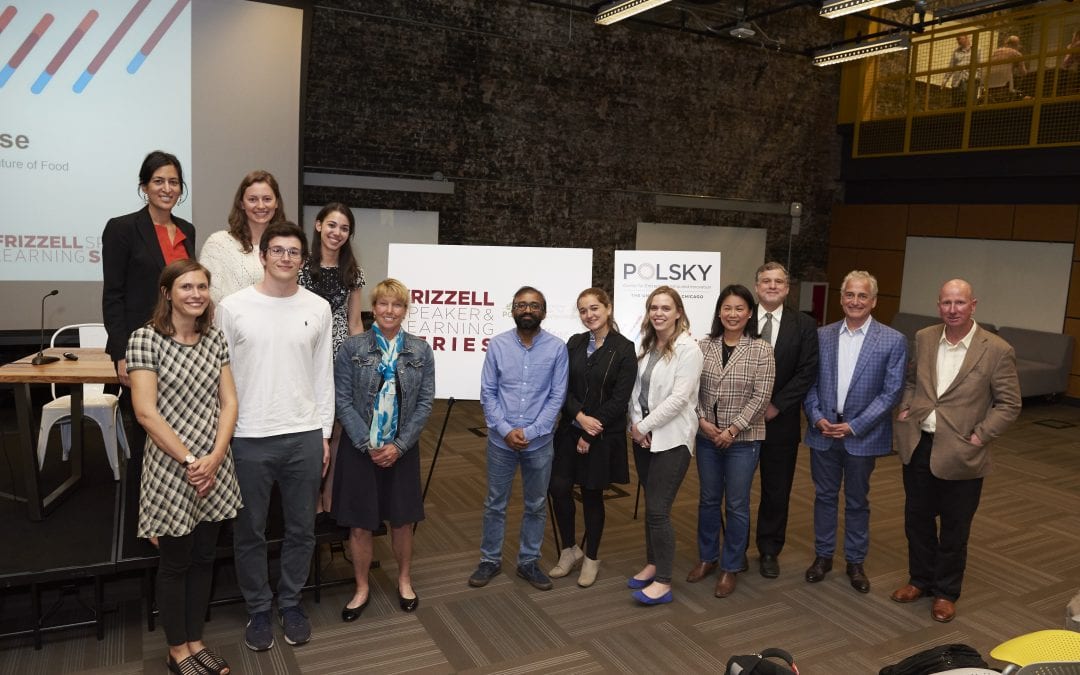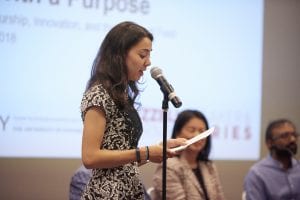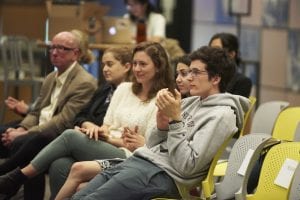By Caitlin Piccirillo-Stosser and Maddy Bol, on behalf of the Frizzell Speaker and Learning Series and the Program on the Global Environment
On May 19, the Frizzell Speaker and Learning Series, the Program on the Global Environment, the Polsky Center for Entrepreneurship and Innovation, and FamilyFarmed hosted panel event, Eat with a Purpose: Entrepreneurship, Innovation, and the Future of Food. We were lucky enough to welcome as our moderator Jim Slama, the CEO and founder of FamilyFarmed, who is largely responsible for the Good Food movement in Chicago. He tactfully led the conversation amongst our four incredible panelists: Jenny Yang, Owner of Phoenix Bean; Raj Karmani, Founder of Zero Percent and CTO of Farmer’s Fridge; Whitney Richardson, Chicago Regional Director of Big Green and Co-Director of the Logan Square Farmers Market; and Mark Thomann, Managing Director of Spiral Sun Ventures.
Each of the panelists provided a short summary of how they became involved in the Good Food movement and the work they have been doing with their respective companies and ventures.
Jim Slama began FamilyFarmed at a time when the “Good Food Movement” was a limited part of the overall consumer market. His goal of expanding production, marketing and distribution of locally grown and responsibly produced food, in order to enhance the social, economic, and environmental health of communities revolutionized the food industry. Under his leadership, FamilyFarmed has catalyzed the movement making a robust Good Food cluster in the nonprofit’s home base of Chicago while expanding the national scope and impact of its work. In 2004, Slama created the Good Food Trade Show which now has become the nation’s oldest and biggest trade show focused on local and sustainable food with a three-day Good Food Festival and Conference (rebranded as the Good Food Expo in March 2018).
Our first panelist, Jenny Yang, is the President of Phoenix Bean, a premier supplier of tofu to the Chicagoland area for over 30 years. In 2006, the owners of Phoenix Bean were considering retirement, and Jenny took the opportunity to purchase the company that she was an ardent fan and consumer of. In 2015, Phoenix Bean’s production grew to 1.2 million pounds of tofu products and is anticipated to hit 2.5 million pounds by 2020. Phoenix Bean’s factory in the Edgewater neighborhood was one of the first local sources of fresh tofu offering local Chinese restaurants and Asian grocers an authenticity that reminded these immigrant communities of their homelands. Today, Phoenix Bean can be found in Whole Foods, Mariano’s, and Green City Markets in Chicago and is currently expanding to a $1.7 million, 10,000-square-foot facility on North Broadway to meet booming consumer demand.
As the CTO of Farmer’s Fridge, a venture-backed startup making fresh food available 24/7 through a growing network of automated fridges, Raj Karmani oversees all engineering and digital products including the fridge IoT technology, hardware, software, website and mobile apps as well as the cloud and data infrastructure. His personal philosophy that technology enables access and personalized magical experiences has inspired his mission to combine modern technology and fresh, sustainable foods. Raj is also a Distinguished Alumni of the Computer Science department at the University of Illinois at Urbana-Champaign where he founded Zero Percent, an online food rescue platform for restaurants and food operators to donate excess food to local charities. Zero Percent has provided 1.5 million meals from 100 businesses to over 80 nonprofits in Chicago and Nashville.
The next panelist, Whitney Richardson, began working with Big Green in 2015 as a Chicago Garden Educator teaching at 40 different outdoor Learning Gardens in Chicago Public schools. She now works as the Chicago Regional Development Manager to ensure growth and longevity of the Chicago food literacy programs. Since 2015, she has also co-directed the Logan Square Farmers Market (LSFM), Chicago’s only weekly, year-round farmers market. In 2016, the LSFM was mentioned in New York Times’ “36 Hours in Chicago”. The following year it was named the best Farmers Market in the state of Illinois by USA Today and has held the title of best farmers market by the Chicago Reader for over 5 years. In her spare time, Richardson consults sustainable food companies and edits proposals for organic produce professionals. She has a BA in International Studies, with a Human Rights concentration, from the University of Iowa, and a Post-Professional Certificate in Sustainable Urban Design from Archeworks.

Whitney Richardson, Chicago Regional Development Manager at Big Green and Co-Director of Logan Square Farmers Market with Mark Thomann, Managing Director of Spiral Sun Ventures (Photo by Joel Wintermantle)
Our final panelist, Mark Thomann, has more than 15 years of experience valuing, structuring, and consummating complex financial transactions involving trademarks/brands and other assets. At Spiral Sun Ventures, a seed capital fund that invests in early-stage companies that create better-for-you consumer products, Thomann serves as the Managing Director overlooking several different early-stage companies focused on health and wellness based products. Currently serving as both Chief Executive Officer of River West Brands and Dormitus Brand, companies that acquire, re-develop, and monetize dormant brands, his leadership resulted in an investment from Omnicom Group, a $14B holding company comprised of marketing firms. Mark also recently served as both Chairman and CEO of FarmedHere, one of the world’s largest indoor farms, during which time he successfully restructured and capitalized the company.
After the the panelist bios, Slama asked a few of his own questions to the panelists before opening up the floor for questions from the audience. The engagement of both faculty and students exhibited a sincere excitement and interest about the work that each panelist was doing as well as the future of food in Chicago and across the nation. In addition, the interconnection among the panelists indicated a communal aspect within the Good Food Movement. Slama’s experience with each panelist from past Good Food events created an effortless interaction between the speakers that translated across to the audience. At one point, Yang spoke about working with Richardson while running a farm stand at the Logan Square Farmers market while Thomann and Karmani touched on their collaboration when Spiral Sun Ventures invested in Farmer’s Fridge. As an audience member, it was extremely rewarding to see how people with different roles in different companies within the Good Food movement are all working together to ensure that healthy, local options are available and affordable for all individuals.







